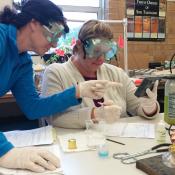Curriculum for Agricultural Science Education (CASE)
Impact
Since CASE’s founding in 2009, 1,134 teachers from 40 states, plus the Virgin Islands are using CASE. These teachers hold a total of 1,826 CASE course certifications. 36,520 students will be taught through a CASE course in the 2015 school year. CASE has the goal of reaching more than 50,000 students by fall 2017.
Accomplished
- Need Accomplished
- Evaluation Developing
- Sustainability Accomplished
- Replication & Scalability Accomplished
- Partnerships Accomplished
- Capacity Accomplished
- Challenging & Relevant Content Accomplished
- STEM Practices Accomplished
- Inspiration Accomplished
- Under-Represented Groups Developing

DuPont is a strong supporter of STEM education using inquiry-based instruction which is the basis for all CASE instruction. CASE is aimed at improving the math and science proficiency of students using an approach that integrates classroom/laboratory instruction, experiential learning and student-directed engagement with leadership, personal growth and career success.
Former Director, Center for Collaborative Research and Education, DuPont
Design Principles
The programs in this database clear a high bar. STEMworks reviewed each program against the Design Principles for Effective STEM Philanthropy. Programs must be Accomplished () across all Design Principles, or be Developing (
) in a maximum of three areas.
Overarching Principles
-
Need Accomplished
Identify and target a compelling and well-defined need.
-
Evaluation Developing
Use rigorous evaluation to continuously measure and inform progress towards the compelling need identified.
-
Sustainability Accomplished
Ensure work is sustainable.
-
Replication & Scalability Accomplished
Demonstrate replicability and scalability.
-
Partnerships Accomplished
Create high impact partnerships.
-
Capacity Accomplished
Ensure organizational capacity to achieve goals.
STEM Principles
-
Challenging & Relevant Content Accomplished
Offer challenging and relevant STEM content for the target audience.
-
STEM Practices Accomplished
Incorporate and encourage STEM practices.
-
Inspiration Accomplished
Inspire interest and engagement in STEM.
-
Under-Represented Groups Developing
Identify and address the needs of under-represented groups.
Program Overview
CASE curricular materials enhance the rigor and relevance of education in agriculture, food, and natural resources (AFNR). Besides elevating the rigor of AFNR knowledge and skills, CASE provides purposeful, applied instruction in core subjects. CASE empowers teachers to change their professional philosophy by promoting powerful inquiry-based, STEM-enriched teaching practices. To foster this environment, CASE develops comprehensive curriculum materials with purposeful design elements to promote rigor and relevance using activity-, project-, and problem-based teaching strategies. CASE courses include lessons that scaffold from previous lessons, leading to deeper understanding of STEM concepts.
To use CASE, a teacher must successfully complete 50 to 100 hours of intense professional development per course. Teachers receive an adequate overview of content, pedagogy, and course design. In addition to the tangible benefits, CASE professional development sessions promote confidence in teaching STEM concepts and encourage participation in a professional learning community to provide teachers with support even after the conclusion of the professional development session. The result of CASE implementation is student-centered learning in an inquiry-based classroom focused on scientific thinking and foundational STEM and core content. CASE is an initiative of the National Council for Agricultural Education and is managed by the National Association of Agricultural Educators (NAAE).
Funders and Partners
Major Funders: Association of Equipment Manufacturers (AEM), Cargill, CHS Foundation, Corteva Agriscience, Darling Ingredients, Equipment Dealers Association, Farm Credit East, Farm Equipment Manufacturers Association, Firestone, John Deere. Program Partners: Over 27 affiliate institutions nationwide (colleges and universities), the National Association of Agricultural Educators, National FFA Foundation, American Technical Publishers, Bio-Rad Laboratories, Cengage Learning, Goodheart-Willcox Publisher, Lab-aids, Newbyte Software, Vernier Software and Technology, and Ward’s Science. CASE certified teachers often partner with colleges and universities to provide college academic credit to high school students completing CASE courses. Several postsecondary institutions including Rutgers University and Blue Ridge Community and Technical College offer articulated credit to CASE students across the country.
